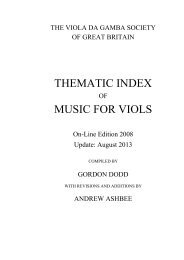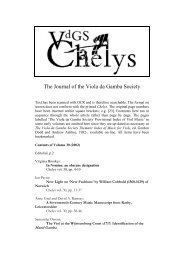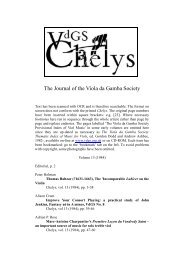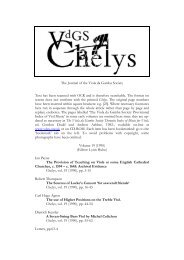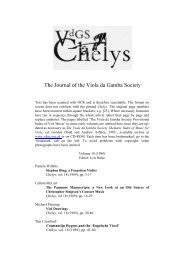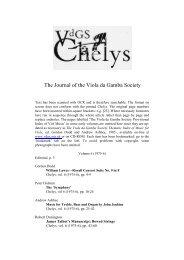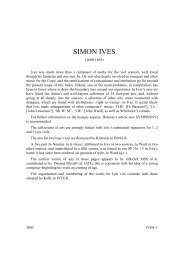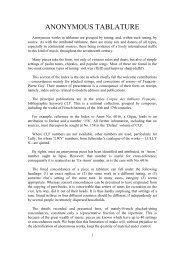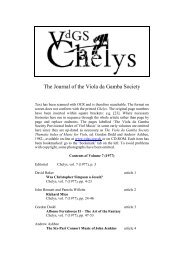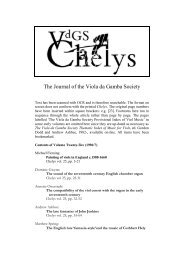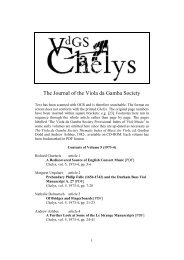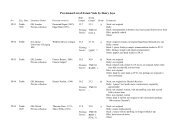Ne irascaris, Domine - The Viola da Gamba Society
Ne irascaris, Domine - The Viola da Gamba Society
Ne irascaris, Domine - The Viola da Gamba Society
Create successful ePaper yourself
Turn your PDF publications into a flip-book with our unique Google optimized e-Paper software.
Editorial<br />
It gives me great pleasure to bring you the fifth issue of the <strong>Viola</strong> <strong>da</strong> <strong>Gamba</strong> <strong>Society</strong><br />
Journal. As with previous volumes there is no overall theme here, but rather an attempt to<br />
present some of the most stimulating research into the history of early stringed<br />
instruments, and particularly the viol, produced over the past twelve months.<br />
Recent discoveries have allowed Andrew Ashbee to take stock of all previous research into<br />
the elusive Polewheel and his ubiquitous Ground. <strong>The</strong> investigation into no fewer than<br />
twenty related sources draws up a fascinating web with possible links to Cornwall and the<br />
network of English Catholic colleges in continental Europe. My article is an examination of<br />
an intriguing manuscript from the second half of the seventeenth century housed in the<br />
Bibliothèque du Conservatoire, Brussels. It contains trios by Italian, English, <strong>Ne</strong>therlandish<br />
and French composers, and informs our understanding of musical exchanges across the<br />
Channel. I would like to thank Andrew Ashbee for undertaking the editing of my<br />
contribution to this volume.<br />
Richard Carter’s article – part one of two dealing with lyra-viol arrangements of music by<br />
William Byrd – considers the evidence afforded by the ffeff/h tablature setting of the<br />
composer’s popular five-part motet <strong>Ne</strong> Irascaris, <strong>Domine</strong>, deftly exploring the suggestions<br />
derived from the process of arrangement and copying, as well as the implications for<br />
performance. Peter Holman’s survey of music for viols available on the internet is a<br />
welcome addition to this issue of the Journal. As online resources for researchers and<br />
performers proliferate, Professor Holman’s thoughts on what is out there and how to make<br />
the most of it will be invaluable to many of us.<br />
<strong>The</strong> current issue also includes four reviews of recently published, highly significant<br />
monographs. Simon McVeigh’s wholehearted recommen<strong>da</strong>tion of Peter Holman’s Life after<br />
Death (a volume reviewed by fellow <strong>Society</strong> member Lucy Robinson in Early Music 39/3)<br />
reflects on the many noteworthy threads weaved by the author into this important book.<br />
Richard Carter’s exceptionally thorough examination of Charles Brewer’s <strong>The</strong> Instrumental<br />
Music of Schmeltzer, Biber, Muffat and their Contemporaries (which also received attention in<br />
Early Music 39/4), recognizes its many virtues, while clarifying errors and pointing out<br />
omissions. We end with Andrew Ashbee’s insightful reviews of two particularly fine<br />
monographs – respectively by Christopher Marsh and John Harley – published in 2010.<br />
In short, these articles and reviews present exciting and compelling evidence that<br />
illuminates several important trends of current research. While there is no general theme to<br />
this issue, those concerned with lyra-viol music, the circulation of music in Early Modern<br />
England, seventeenth-century instrumental music from Central Europe, the growth of<br />
online resources, Byrd scholarship, the later history of the viol, and the musical networks<br />
created by exiled English recusants, will find something of interest here.<br />
I am grateful to the general editor, Andrew Ashbee, and all other contributors for<br />
supporting and encouraging me through what has been a rewarding and thought-provoking<br />
first experience as Journal editor.<br />
iv<br />
PATXI DEL AMO<br />
London, January 2012



